An Overview of Supervising the Guest Experience in Restaurant Business
VerifiedAdded on 2023/01/12
|9
|2380
|77
Report
AI Summary
This report provides a detailed overview of the role of a supervisor in the food and beverage industry, with a focus on guest experience management. It begins by highlighting the importance of human resources and the supervisor's contribution to developing staff skills and meeting organizational standards. The main body discusses the supervisor's key responsibilities, including overseeing front and back-of-house operations, ensuring food quality, managing staff evaluations, and maintaining health code compliance. The report also covers essential supervisory skills such as effective communication, proactive management, and problem-solving abilities. It explores the factors that influence supervisory decisions, such as executive ability, nature of work, staff training, time availability, and the quality of planning and communication systems. Finally, the report includes an action plan for personal development, outlining areas for improvement in problem-solving, building a sense of control, and enhancing communication skills to build a resilient workforce. This comprehensive analysis is designed to help supervisors create a positive environment and enhance customer satisfaction within a restaurant setting.
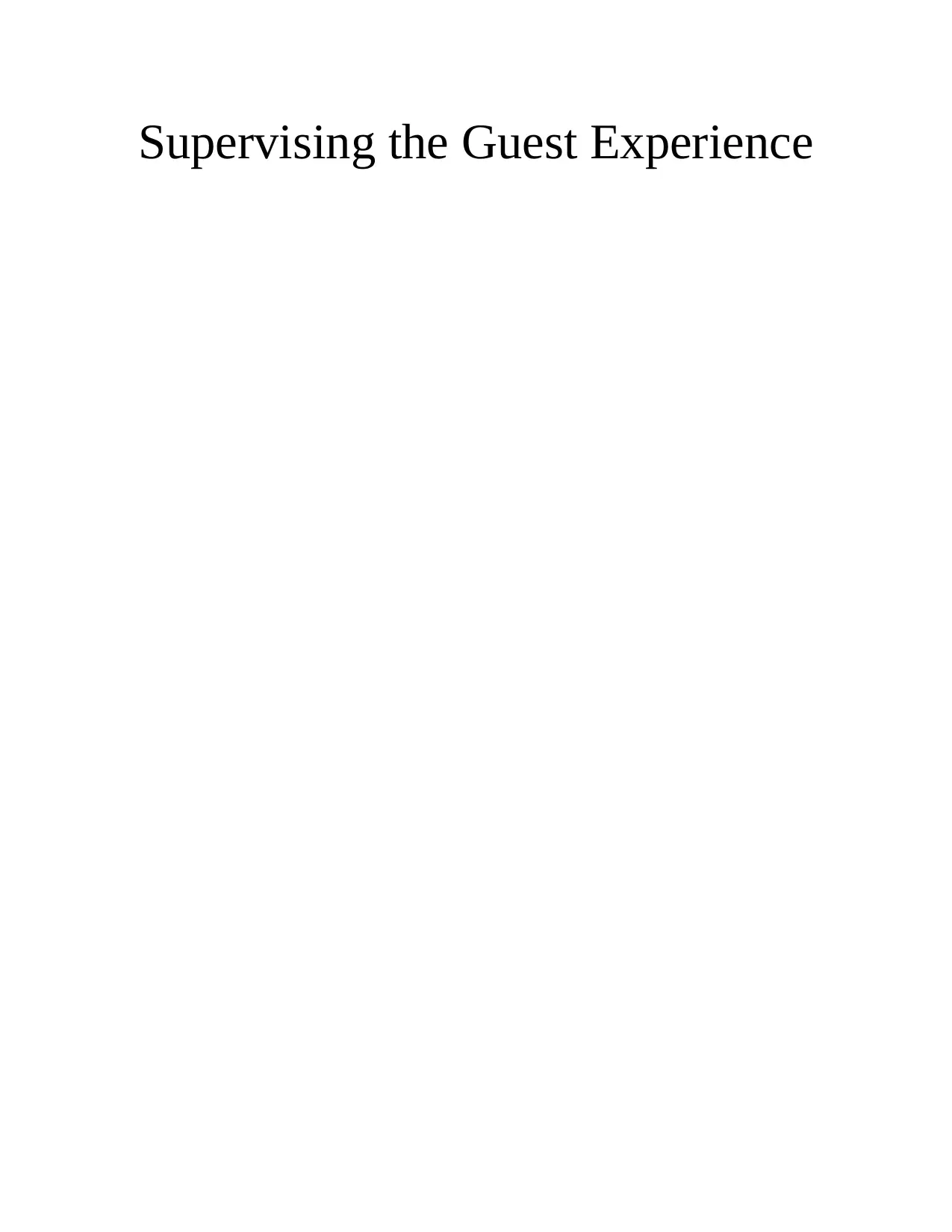
Supervising the Guest Experience
Paraphrase This Document
Need a fresh take? Get an instant paraphrase of this document with our AI Paraphraser
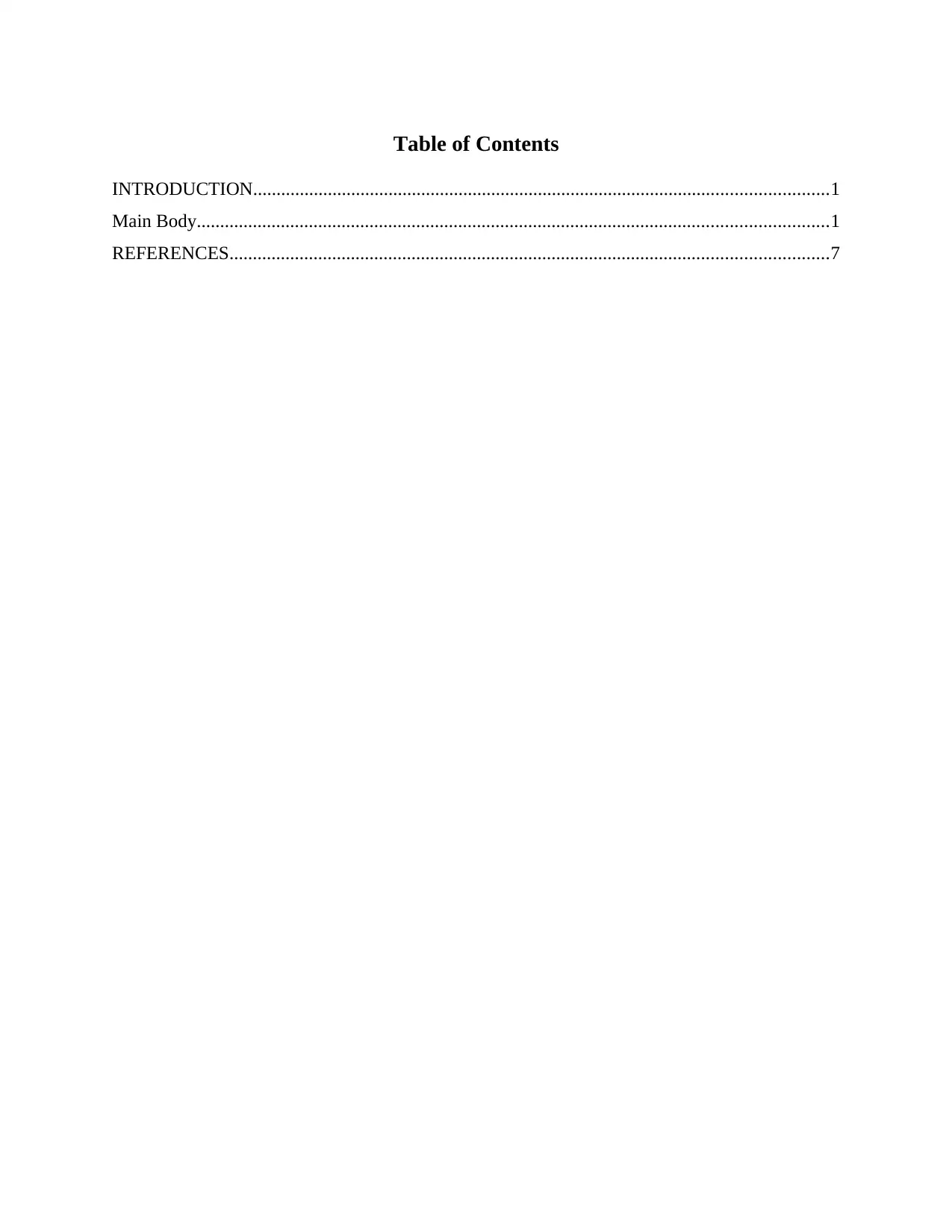
Table of Contents
INTRODUCTION...........................................................................................................................1
Main Body.......................................................................................................................................1
REFERENCES................................................................................................................................7
INTRODUCTION...........................................................................................................................1
Main Body.......................................................................................................................................1
REFERENCES................................................................................................................................7
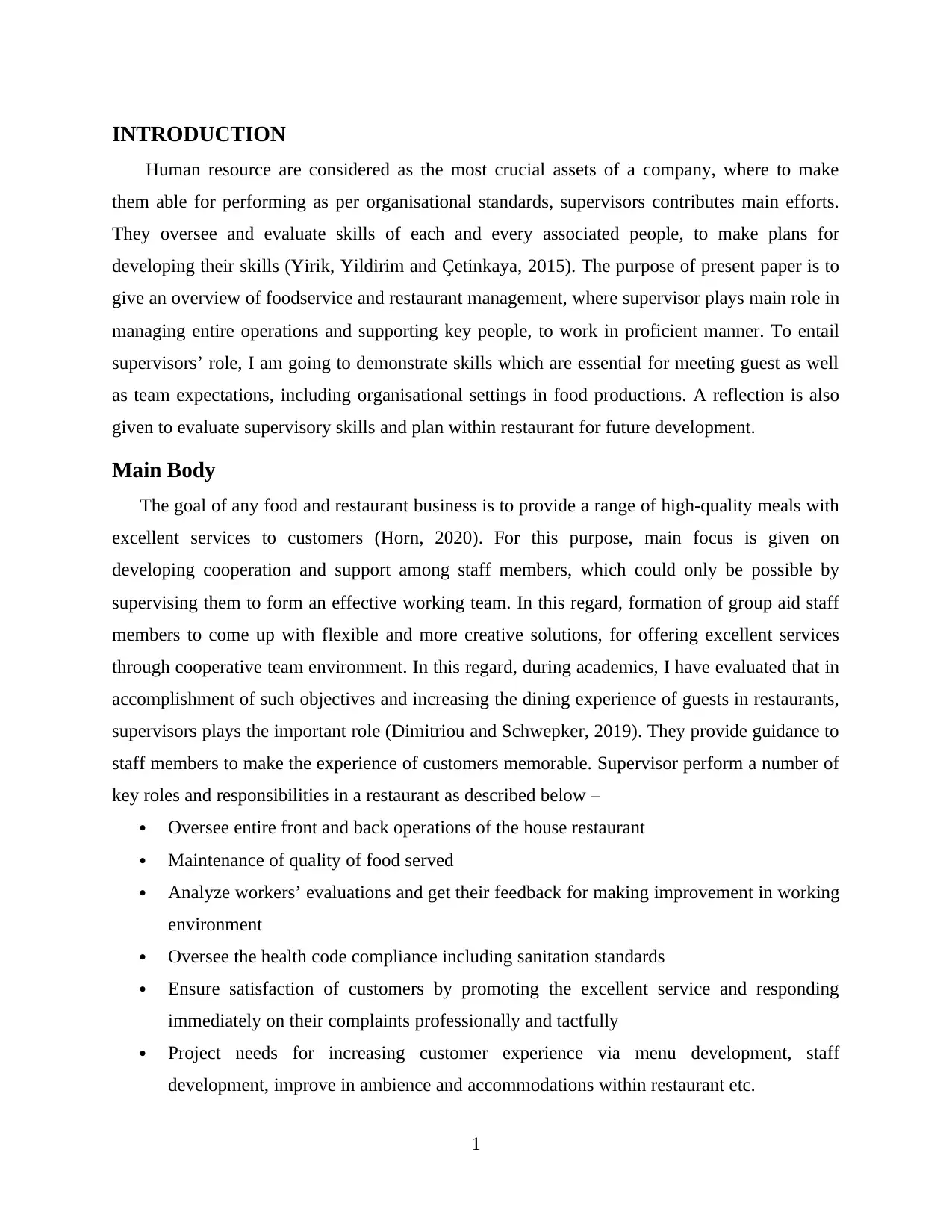
INTRODUCTION
Human resource are considered as the most crucial assets of a company, where to make
them able for performing as per organisational standards, supervisors contributes main efforts.
They oversee and evaluate skills of each and every associated people, to make plans for
developing their skills (Yirik, Yildirim and Çetinkaya, 2015). The purpose of present paper is to
give an overview of foodservice and restaurant management, where supervisor plays main role in
managing entire operations and supporting key people, to work in proficient manner. To entail
supervisors’ role, I am going to demonstrate skills which are essential for meeting guest as well
as team expectations, including organisational settings in food productions. A reflection is also
given to evaluate supervisory skills and plan within restaurant for future development.
Main Body
The goal of any food and restaurant business is to provide a range of high-quality meals with
excellent services to customers (Horn, 2020). For this purpose, main focus is given on
developing cooperation and support among staff members, which could only be possible by
supervising them to form an effective working team. In this regard, formation of group aid staff
members to come up with flexible and more creative solutions, for offering excellent services
through cooperative team environment. In this regard, during academics, I have evaluated that in
accomplishment of such objectives and increasing the dining experience of guests in restaurants,
supervisors plays the important role (Dimitriou and Schwepker, 2019). They provide guidance to
staff members to make the experience of customers memorable. Supervisor perform a number of
key roles and responsibilities in a restaurant as described below –
Oversee entire front and back operations of the house restaurant
Maintenance of quality of food served
Analyze workers’ evaluations and get their feedback for making improvement in working
environment
Oversee the health code compliance including sanitation standards
Ensure satisfaction of customers by promoting the excellent service and responding
immediately on their complaints professionally and tactfully
Project needs for increasing customer experience via menu development, staff
development, improve in ambience and accommodations within restaurant etc.
1
Human resource are considered as the most crucial assets of a company, where to make
them able for performing as per organisational standards, supervisors contributes main efforts.
They oversee and evaluate skills of each and every associated people, to make plans for
developing their skills (Yirik, Yildirim and Çetinkaya, 2015). The purpose of present paper is to
give an overview of foodservice and restaurant management, where supervisor plays main role in
managing entire operations and supporting key people, to work in proficient manner. To entail
supervisors’ role, I am going to demonstrate skills which are essential for meeting guest as well
as team expectations, including organisational settings in food productions. A reflection is also
given to evaluate supervisory skills and plan within restaurant for future development.
Main Body
The goal of any food and restaurant business is to provide a range of high-quality meals with
excellent services to customers (Horn, 2020). For this purpose, main focus is given on
developing cooperation and support among staff members, which could only be possible by
supervising them to form an effective working team. In this regard, formation of group aid staff
members to come up with flexible and more creative solutions, for offering excellent services
through cooperative team environment. In this regard, during academics, I have evaluated that in
accomplishment of such objectives and increasing the dining experience of guests in restaurants,
supervisors plays the important role (Dimitriou and Schwepker, 2019). They provide guidance to
staff members to make the experience of customers memorable. Supervisor perform a number of
key roles and responsibilities in a restaurant as described below –
Oversee entire front and back operations of the house restaurant
Maintenance of quality of food served
Analyze workers’ evaluations and get their feedback for making improvement in working
environment
Oversee the health code compliance including sanitation standards
Ensure satisfaction of customers by promoting the excellent service and responding
immediately on their complaints professionally and tactfully
Project needs for increasing customer experience via menu development, staff
development, improve in ambience and accommodations within restaurant etc.
1
⊘ This is a preview!⊘
Do you want full access?
Subscribe today to unlock all pages.

Trusted by 1+ million students worldwide
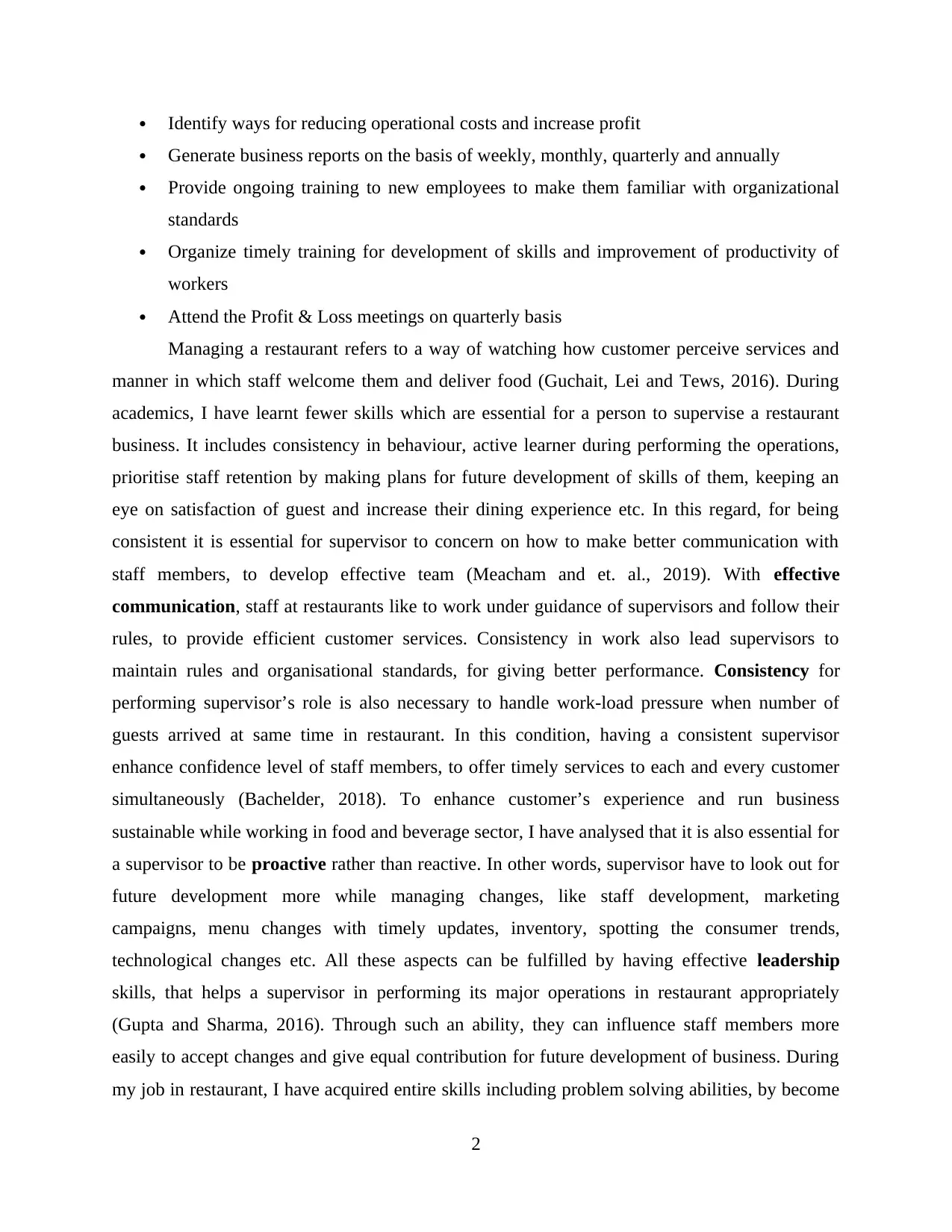
Identify ways for reducing operational costs and increase profit
Generate business reports on the basis of weekly, monthly, quarterly and annually
Provide ongoing training to new employees to make them familiar with organizational
standards
Organize timely training for development of skills and improvement of productivity of
workers
Attend the Profit & Loss meetings on quarterly basis
Managing a restaurant refers to a way of watching how customer perceive services and
manner in which staff welcome them and deliver food (Guchait, Lei and Tews, 2016). During
academics, I have learnt fewer skills which are essential for a person to supervise a restaurant
business. It includes consistency in behaviour, active learner during performing the operations,
prioritise staff retention by making plans for future development of skills of them, keeping an
eye on satisfaction of guest and increase their dining experience etc. In this regard, for being
consistent it is essential for supervisor to concern on how to make better communication with
staff members, to develop effective team (Meacham and et. al., 2019). With effective
communication, staff at restaurants like to work under guidance of supervisors and follow their
rules, to provide efficient customer services. Consistency in work also lead supervisors to
maintain rules and organisational standards, for giving better performance. Consistency for
performing supervisor’s role is also necessary to handle work-load pressure when number of
guests arrived at same time in restaurant. In this condition, having a consistent supervisor
enhance confidence level of staff members, to offer timely services to each and every customer
simultaneously (Bachelder, 2018). To enhance customer’s experience and run business
sustainable while working in food and beverage sector, I have analysed that it is also essential for
a supervisor to be proactive rather than reactive. In other words, supervisor have to look out for
future development more while managing changes, like staff development, marketing
campaigns, menu changes with timely updates, inventory, spotting the consumer trends,
technological changes etc. All these aspects can be fulfilled by having effective leadership
skills, that helps a supervisor in performing its major operations in restaurant appropriately
(Gupta and Sharma, 2016). Through such an ability, they can influence staff members more
easily to accept changes and give equal contribution for future development of business. During
my job in restaurant, I have acquired entire skills including problem solving abilities, by become
2
Generate business reports on the basis of weekly, monthly, quarterly and annually
Provide ongoing training to new employees to make them familiar with organizational
standards
Organize timely training for development of skills and improvement of productivity of
workers
Attend the Profit & Loss meetings on quarterly basis
Managing a restaurant refers to a way of watching how customer perceive services and
manner in which staff welcome them and deliver food (Guchait, Lei and Tews, 2016). During
academics, I have learnt fewer skills which are essential for a person to supervise a restaurant
business. It includes consistency in behaviour, active learner during performing the operations,
prioritise staff retention by making plans for future development of skills of them, keeping an
eye on satisfaction of guest and increase their dining experience etc. In this regard, for being
consistent it is essential for supervisor to concern on how to make better communication with
staff members, to develop effective team (Meacham and et. al., 2019). With effective
communication, staff at restaurants like to work under guidance of supervisors and follow their
rules, to provide efficient customer services. Consistency in work also lead supervisors to
maintain rules and organisational standards, for giving better performance. Consistency for
performing supervisor’s role is also necessary to handle work-load pressure when number of
guests arrived at same time in restaurant. In this condition, having a consistent supervisor
enhance confidence level of staff members, to offer timely services to each and every customer
simultaneously (Bachelder, 2018). To enhance customer’s experience and run business
sustainable while working in food and beverage sector, I have analysed that it is also essential for
a supervisor to be proactive rather than reactive. In other words, supervisor have to look out for
future development more while managing changes, like staff development, marketing
campaigns, menu changes with timely updates, inventory, spotting the consumer trends,
technological changes etc. All these aspects can be fulfilled by having effective leadership
skills, that helps a supervisor in performing its major operations in restaurant appropriately
(Gupta and Sharma, 2016). Through such an ability, they can influence staff members more
easily to accept changes and give equal contribution for future development of business. During
my job in restaurant, I have acquired entire skills including problem solving abilities, by become
2
Paraphrase This Document
Need a fresh take? Get an instant paraphrase of this document with our AI Paraphraser
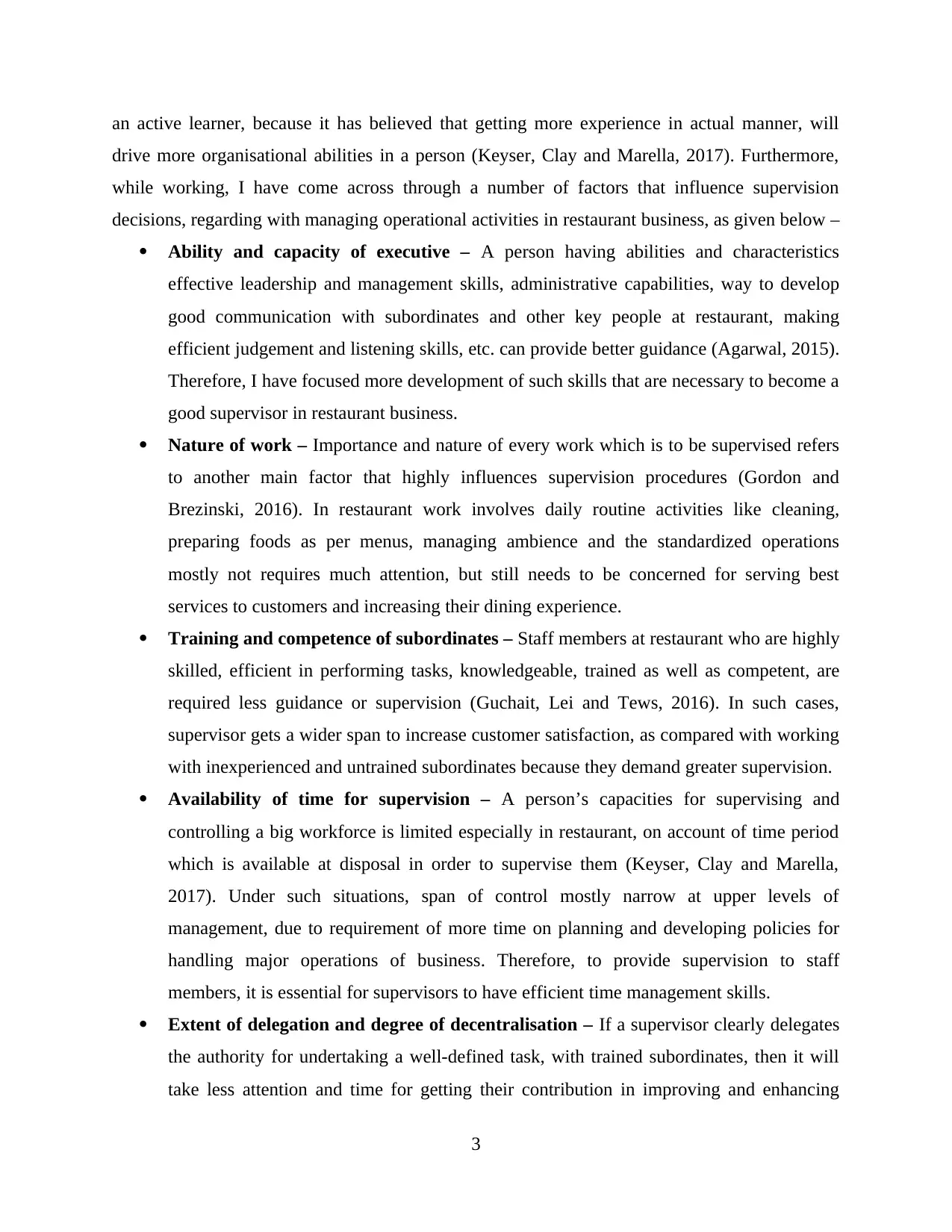
an active learner, because it has believed that getting more experience in actual manner, will
drive more organisational abilities in a person (Keyser, Clay and Marella, 2017). Furthermore,
while working, I have come across through a number of factors that influence supervision
decisions, regarding with managing operational activities in restaurant business, as given below –
Ability and capacity of executive – A person having abilities and characteristics
effective leadership and management skills, administrative capabilities, way to develop
good communication with subordinates and other key people at restaurant, making
efficient judgement and listening skills, etc. can provide better guidance (Agarwal, 2015).
Therefore, I have focused more development of such skills that are necessary to become a
good supervisor in restaurant business.
Nature of work – Importance and nature of every work which is to be supervised refers
to another main factor that highly influences supervision procedures (Gordon and
Brezinski, 2016). In restaurant work involves daily routine activities like cleaning,
preparing foods as per menus, managing ambience and the standardized operations
mostly not requires much attention, but still needs to be concerned for serving best
services to customers and increasing their dining experience.
Training and competence of subordinates – Staff members at restaurant who are highly
skilled, efficient in performing tasks, knowledgeable, trained as well as competent, are
required less guidance or supervision (Guchait, Lei and Tews, 2016). In such cases,
supervisor gets a wider span to increase customer satisfaction, as compared with working
with inexperienced and untrained subordinates because they demand greater supervision.
Availability of time for supervision – A person’s capacities for supervising and
controlling a big workforce is limited especially in restaurant, on account of time period
which is available at disposal in order to supervise them (Keyser, Clay and Marella,
2017). Under such situations, span of control mostly narrow at upper levels of
management, due to requirement of more time on planning and developing policies for
handling major operations of business. Therefore, to provide supervision to staff
members, it is essential for supervisors to have efficient time management skills.
Extent of delegation and degree of decentralisation – If a supervisor clearly delegates
the authority for undertaking a well-defined task, with trained subordinates, then it will
take less attention and time for getting their contribution in improving and enhancing
3
drive more organisational abilities in a person (Keyser, Clay and Marella, 2017). Furthermore,
while working, I have come across through a number of factors that influence supervision
decisions, regarding with managing operational activities in restaurant business, as given below –
Ability and capacity of executive – A person having abilities and characteristics
effective leadership and management skills, administrative capabilities, way to develop
good communication with subordinates and other key people at restaurant, making
efficient judgement and listening skills, etc. can provide better guidance (Agarwal, 2015).
Therefore, I have focused more development of such skills that are necessary to become a
good supervisor in restaurant business.
Nature of work – Importance and nature of every work which is to be supervised refers
to another main factor that highly influences supervision procedures (Gordon and
Brezinski, 2016). In restaurant work involves daily routine activities like cleaning,
preparing foods as per menus, managing ambience and the standardized operations
mostly not requires much attention, but still needs to be concerned for serving best
services to customers and increasing their dining experience.
Training and competence of subordinates – Staff members at restaurant who are highly
skilled, efficient in performing tasks, knowledgeable, trained as well as competent, are
required less guidance or supervision (Guchait, Lei and Tews, 2016). In such cases,
supervisor gets a wider span to increase customer satisfaction, as compared with working
with inexperienced and untrained subordinates because they demand greater supervision.
Availability of time for supervision – A person’s capacities for supervising and
controlling a big workforce is limited especially in restaurant, on account of time period
which is available at disposal in order to supervise them (Keyser, Clay and Marella,
2017). Under such situations, span of control mostly narrow at upper levels of
management, due to requirement of more time on planning and developing policies for
handling major operations of business. Therefore, to provide supervision to staff
members, it is essential for supervisors to have efficient time management skills.
Extent of delegation and degree of decentralisation – If a supervisor clearly delegates
the authority for undertaking a well-defined task, with trained subordinates, then it will
take less attention and time for getting their contribution in improving and enhancing
3
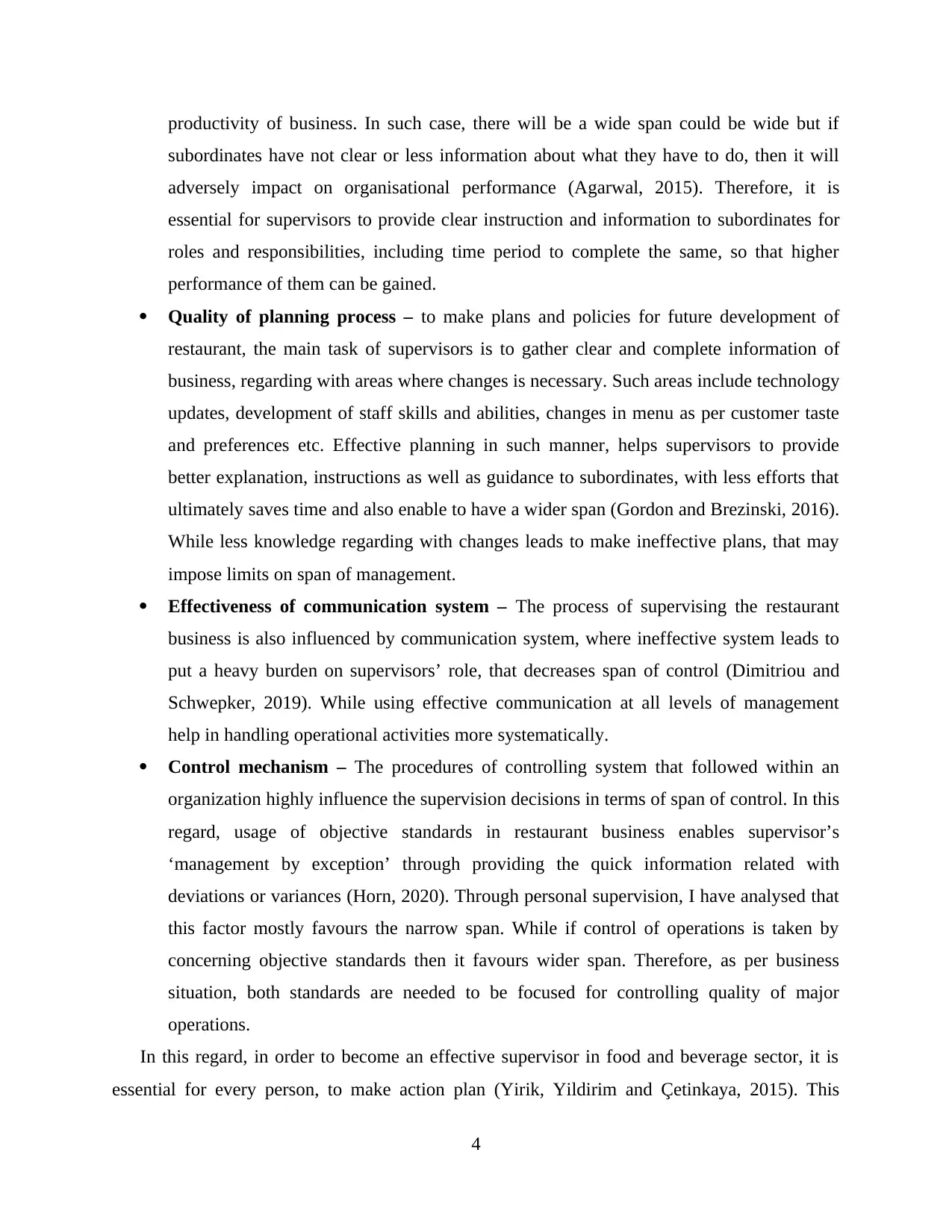
productivity of business. In such case, there will be a wide span could be wide but if
subordinates have not clear or less information about what they have to do, then it will
adversely impact on organisational performance (Agarwal, 2015). Therefore, it is
essential for supervisors to provide clear instruction and information to subordinates for
roles and responsibilities, including time period to complete the same, so that higher
performance of them can be gained.
Quality of planning process – to make plans and policies for future development of
restaurant, the main task of supervisors is to gather clear and complete information of
business, regarding with areas where changes is necessary. Such areas include technology
updates, development of staff skills and abilities, changes in menu as per customer taste
and preferences etc. Effective planning in such manner, helps supervisors to provide
better explanation, instructions as well as guidance to subordinates, with less efforts that
ultimately saves time and also enable to have a wider span (Gordon and Brezinski, 2016).
While less knowledge regarding with changes leads to make ineffective plans, that may
impose limits on span of management.
Effectiveness of communication system – The process of supervising the restaurant
business is also influenced by communication system, where ineffective system leads to
put a heavy burden on supervisors’ role, that decreases span of control (Dimitriou and
Schwepker, 2019). While using effective communication at all levels of management
help in handling operational activities more systematically.
Control mechanism – The procedures of controlling system that followed within an
organization highly influence the supervision decisions in terms of span of control. In this
regard, usage of objective standards in restaurant business enables supervisor’s
‘management by exception’ through providing the quick information related with
deviations or variances (Horn, 2020). Through personal supervision, I have analysed that
this factor mostly favours the narrow span. While if control of operations is taken by
concerning objective standards then it favours wider span. Therefore, as per business
situation, both standards are needed to be focused for controlling quality of major
operations.
In this regard, in order to become an effective supervisor in food and beverage sector, it is
essential for every person, to make action plan (Yirik, Yildirim and Çetinkaya, 2015). This
4
subordinates have not clear or less information about what they have to do, then it will
adversely impact on organisational performance (Agarwal, 2015). Therefore, it is
essential for supervisors to provide clear instruction and information to subordinates for
roles and responsibilities, including time period to complete the same, so that higher
performance of them can be gained.
Quality of planning process – to make plans and policies for future development of
restaurant, the main task of supervisors is to gather clear and complete information of
business, regarding with areas where changes is necessary. Such areas include technology
updates, development of staff skills and abilities, changes in menu as per customer taste
and preferences etc. Effective planning in such manner, helps supervisors to provide
better explanation, instructions as well as guidance to subordinates, with less efforts that
ultimately saves time and also enable to have a wider span (Gordon and Brezinski, 2016).
While less knowledge regarding with changes leads to make ineffective plans, that may
impose limits on span of management.
Effectiveness of communication system – The process of supervising the restaurant
business is also influenced by communication system, where ineffective system leads to
put a heavy burden on supervisors’ role, that decreases span of control (Dimitriou and
Schwepker, 2019). While using effective communication at all levels of management
help in handling operational activities more systematically.
Control mechanism – The procedures of controlling system that followed within an
organization highly influence the supervision decisions in terms of span of control. In this
regard, usage of objective standards in restaurant business enables supervisor’s
‘management by exception’ through providing the quick information related with
deviations or variances (Horn, 2020). Through personal supervision, I have analysed that
this factor mostly favours the narrow span. While if control of operations is taken by
concerning objective standards then it favours wider span. Therefore, as per business
situation, both standards are needed to be focused for controlling quality of major
operations.
In this regard, in order to become an effective supervisor in food and beverage sector, it is
essential for every person, to make action plan (Yirik, Yildirim and Çetinkaya, 2015). This
4
⊘ This is a preview!⊘
Do you want full access?
Subscribe today to unlock all pages.

Trusted by 1+ million students worldwide
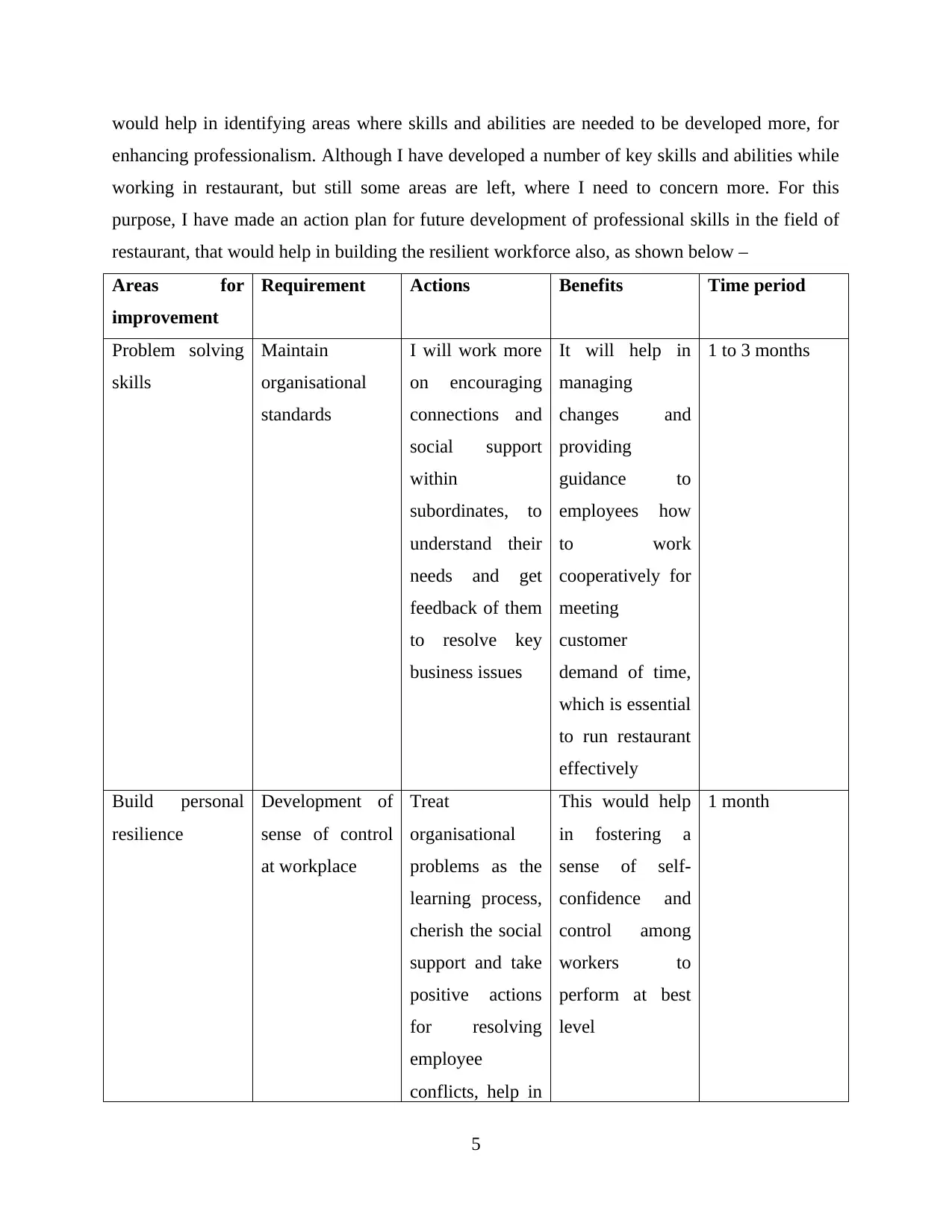
would help in identifying areas where skills and abilities are needed to be developed more, for
enhancing professionalism. Although I have developed a number of key skills and abilities while
working in restaurant, but still some areas are left, where I need to concern more. For this
purpose, I have made an action plan for future development of professional skills in the field of
restaurant, that would help in building the resilient workforce also, as shown below –
Areas for
improvement
Requirement Actions Benefits Time period
Problem solving
skills
Maintain
organisational
standards
I will work more
on encouraging
connections and
social support
within
subordinates, to
understand their
needs and get
feedback of them
to resolve key
business issues
It will help in
managing
changes and
providing
guidance to
employees how
to work
cooperatively for
meeting
customer
demand of time,
which is essential
to run restaurant
effectively
1 to 3 months
Build personal
resilience
Development of
sense of control
at workplace
Treat
organisational
problems as the
learning process,
cherish the social
support and take
positive actions
for resolving
employee
conflicts, help in
This would help
in fostering a
sense of self-
confidence and
control among
workers to
perform at best
level
1 month
5
enhancing professionalism. Although I have developed a number of key skills and abilities while
working in restaurant, but still some areas are left, where I need to concern more. For this
purpose, I have made an action plan for future development of professional skills in the field of
restaurant, that would help in building the resilient workforce also, as shown below –
Areas for
improvement
Requirement Actions Benefits Time period
Problem solving
skills
Maintain
organisational
standards
I will work more
on encouraging
connections and
social support
within
subordinates, to
understand their
needs and get
feedback of them
to resolve key
business issues
It will help in
managing
changes and
providing
guidance to
employees how
to work
cooperatively for
meeting
customer
demand of time,
which is essential
to run restaurant
effectively
1 to 3 months
Build personal
resilience
Development of
sense of control
at workplace
Treat
organisational
problems as the
learning process,
cherish the social
support and take
positive actions
for resolving
employee
conflicts, help in
This would help
in fostering a
sense of self-
confidence and
control among
workers to
perform at best
level
1 month
5
Paraphrase This Document
Need a fresh take? Get an instant paraphrase of this document with our AI Paraphraser
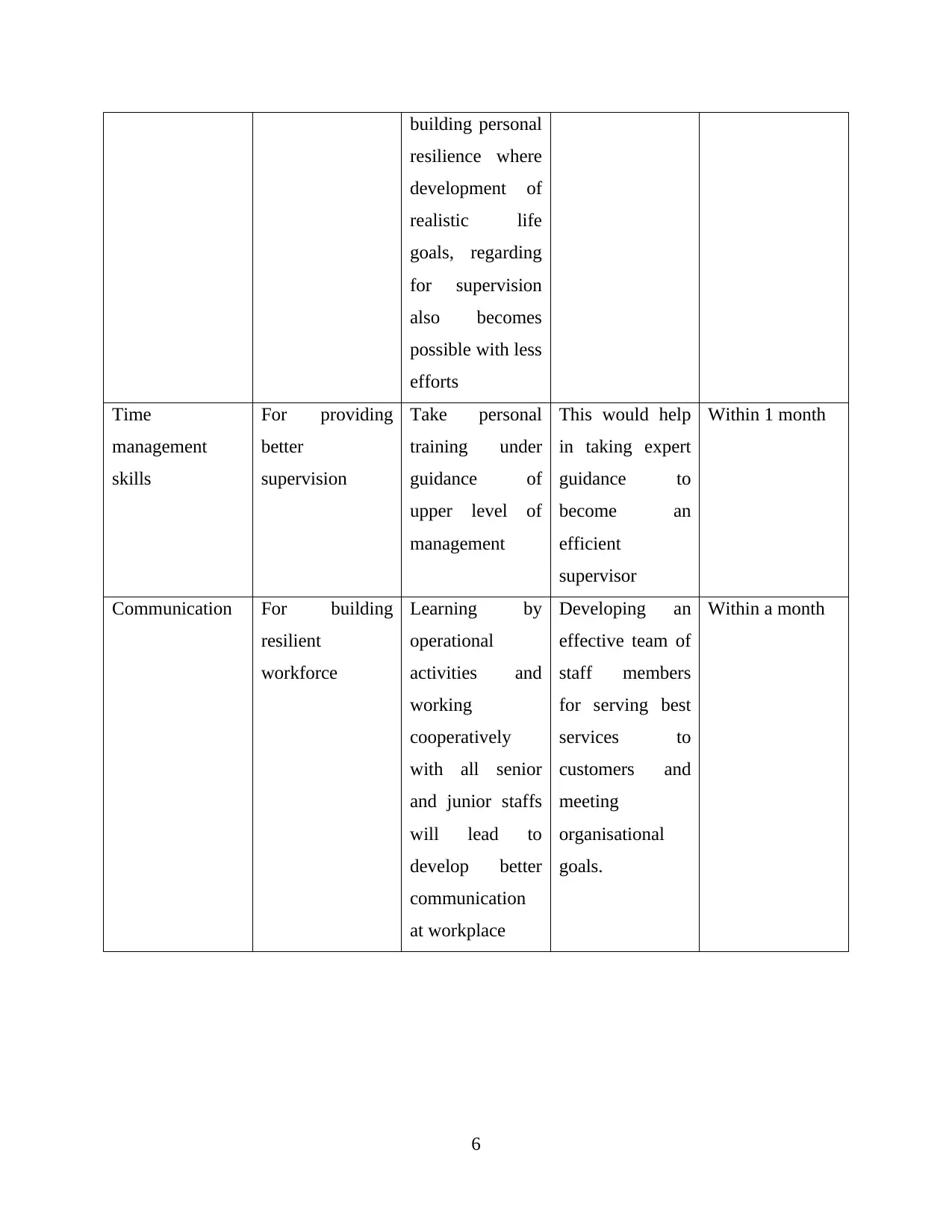
building personal
resilience where
development of
realistic life
goals, regarding
for supervision
also becomes
possible with less
efforts
Time
management
skills
For providing
better
supervision
Take personal
training under
guidance of
upper level of
management
This would help
in taking expert
guidance to
become an
efficient
supervisor
Within 1 month
Communication For building
resilient
workforce
Learning by
operational
activities and
working
cooperatively
with all senior
and junior staffs
will lead to
develop better
communication
at workplace
Developing an
effective team of
staff members
for serving best
services to
customers and
meeting
organisational
goals.
Within a month
6
resilience where
development of
realistic life
goals, regarding
for supervision
also becomes
possible with less
efforts
Time
management
skills
For providing
better
supervision
Take personal
training under
guidance of
upper level of
management
This would help
in taking expert
guidance to
become an
efficient
supervisor
Within 1 month
Communication For building
resilient
workforce
Learning by
operational
activities and
working
cooperatively
with all senior
and junior staffs
will lead to
develop better
communication
at workplace
Developing an
effective team of
staff members
for serving best
services to
customers and
meeting
organisational
goals.
Within a month
6
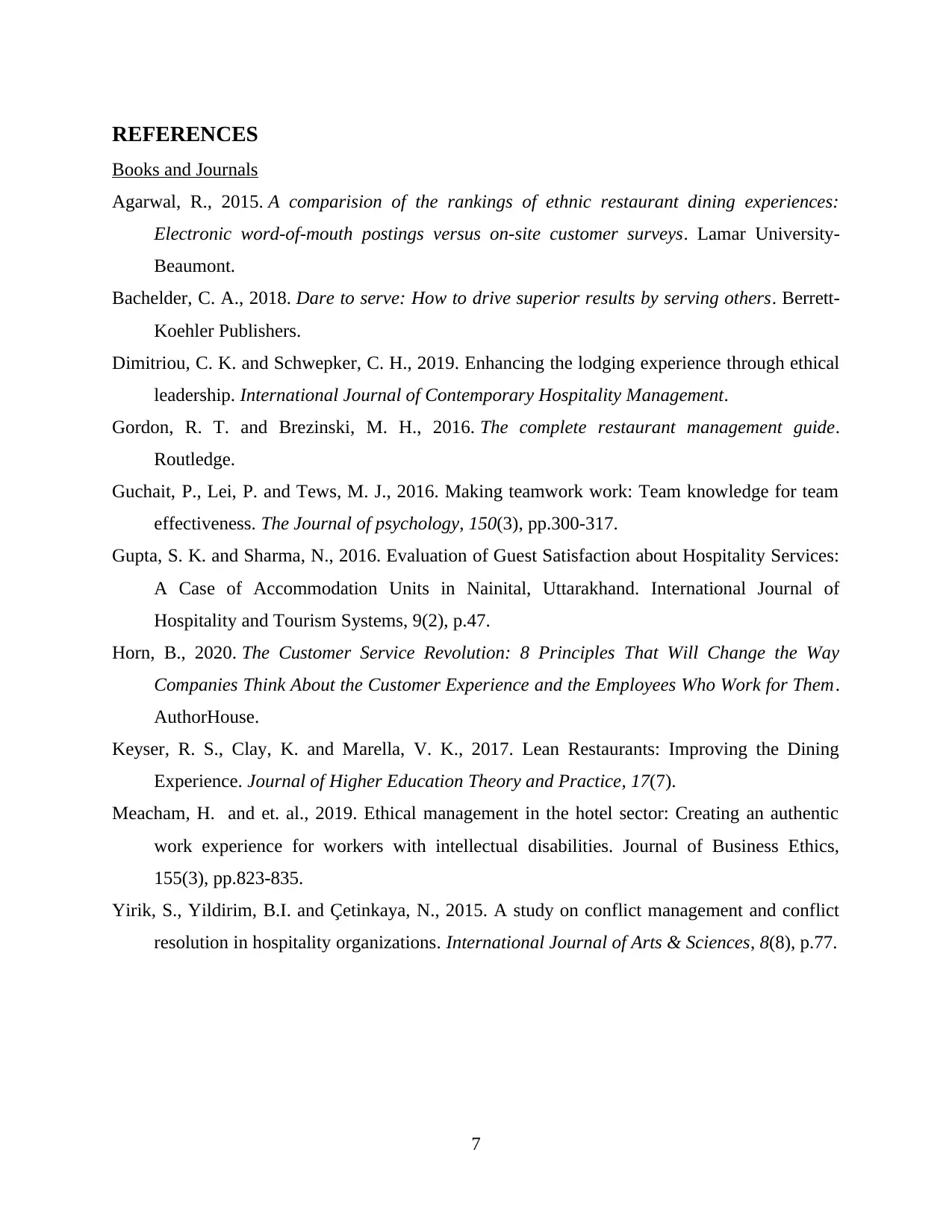
REFERENCES
Books and Journals
Agarwal, R., 2015. A comparision of the rankings of ethnic restaurant dining experiences:
Electronic word-of-mouth postings versus on-site customer surveys. Lamar University-
Beaumont.
Bachelder, C. A., 2018. Dare to serve: How to drive superior results by serving others. Berrett-
Koehler Publishers.
Dimitriou, C. K. and Schwepker, C. H., 2019. Enhancing the lodging experience through ethical
leadership. International Journal of Contemporary Hospitality Management.
Gordon, R. T. and Brezinski, M. H., 2016. The complete restaurant management guide.
Routledge.
Guchait, P., Lei, P. and Tews, M. J., 2016. Making teamwork work: Team knowledge for team
effectiveness. The Journal of psychology, 150(3), pp.300-317.
Gupta, S. K. and Sharma, N., 2016. Evaluation of Guest Satisfaction about Hospitality Services:
A Case of Accommodation Units in Nainital, Uttarakhand. International Journal of
Hospitality and Tourism Systems, 9(2), p.47.
Horn, B., 2020. The Customer Service Revolution: 8 Principles That Will Change the Way
Companies Think About the Customer Experience and the Employees Who Work for Them.
AuthorHouse.
Keyser, R. S., Clay, K. and Marella, V. K., 2017. Lean Restaurants: Improving the Dining
Experience. Journal of Higher Education Theory and Practice, 17(7).
Meacham, H. and et. al., 2019. Ethical management in the hotel sector: Creating an authentic
work experience for workers with intellectual disabilities. Journal of Business Ethics,
155(3), pp.823-835.
Yirik, S., Yildirim, B.I. and Çetinkaya, N., 2015. A study on conflict management and conflict
resolution in hospitality organizations. International Journal of Arts & Sciences, 8(8), p.77.
7
Books and Journals
Agarwal, R., 2015. A comparision of the rankings of ethnic restaurant dining experiences:
Electronic word-of-mouth postings versus on-site customer surveys. Lamar University-
Beaumont.
Bachelder, C. A., 2018. Dare to serve: How to drive superior results by serving others. Berrett-
Koehler Publishers.
Dimitriou, C. K. and Schwepker, C. H., 2019. Enhancing the lodging experience through ethical
leadership. International Journal of Contemporary Hospitality Management.
Gordon, R. T. and Brezinski, M. H., 2016. The complete restaurant management guide.
Routledge.
Guchait, P., Lei, P. and Tews, M. J., 2016. Making teamwork work: Team knowledge for team
effectiveness. The Journal of psychology, 150(3), pp.300-317.
Gupta, S. K. and Sharma, N., 2016. Evaluation of Guest Satisfaction about Hospitality Services:
A Case of Accommodation Units in Nainital, Uttarakhand. International Journal of
Hospitality and Tourism Systems, 9(2), p.47.
Horn, B., 2020. The Customer Service Revolution: 8 Principles That Will Change the Way
Companies Think About the Customer Experience and the Employees Who Work for Them.
AuthorHouse.
Keyser, R. S., Clay, K. and Marella, V. K., 2017. Lean Restaurants: Improving the Dining
Experience. Journal of Higher Education Theory and Practice, 17(7).
Meacham, H. and et. al., 2019. Ethical management in the hotel sector: Creating an authentic
work experience for workers with intellectual disabilities. Journal of Business Ethics,
155(3), pp.823-835.
Yirik, S., Yildirim, B.I. and Çetinkaya, N., 2015. A study on conflict management and conflict
resolution in hospitality organizations. International Journal of Arts & Sciences, 8(8), p.77.
7
⊘ This is a preview!⊘
Do you want full access?
Subscribe today to unlock all pages.

Trusted by 1+ million students worldwide
1 out of 9
Related Documents
Your All-in-One AI-Powered Toolkit for Academic Success.
+13062052269
info@desklib.com
Available 24*7 on WhatsApp / Email
![[object Object]](/_next/static/media/star-bottom.7253800d.svg)
Unlock your academic potential
Copyright © 2020–2026 A2Z Services. All Rights Reserved. Developed and managed by ZUCOL.





